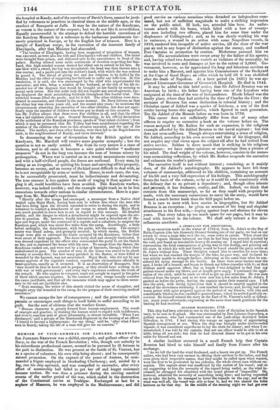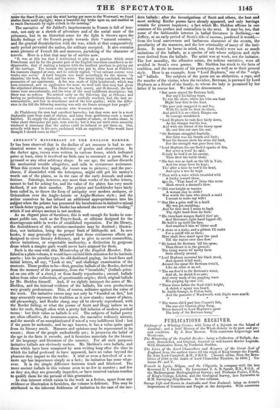MEMOIR OF VICE-ADMIRAL SIR JAHLEEL BRENTON. SIR JAHLEEL BRENTON was
a skilful, energetic, and gallant officer of the Navy, in the war of the French Revolution ; who, though not unlucky in his subordinate professional career, seemed to be pursued by ill fortune in the path to distinction. He was present at the battle of St. Vincent, but as a species of volunteer, his own ship being absent; and he consequently missed promotion. On the rupture of the peace of Amiens, he com- manded a frigate employed in blockading Cherbourg; and, misled by a fog, run his ship aground, and was compelled to surrender, after every effort of seamanship bad failed to get her off and longer resistance became useless. He was thus a prisoner during the stirring nautical events of the earlier period of the war, which ended in the destruction of the Continental navies at Trafalgar. Exchanged at last for a nephew of Massena, he was employed in the Mediterranean ; and did
good service on various occasions when detached on indellendent com- mand, but not of sufficient magnitude to make a striking impression on the public mind. III luck, too, attended him here. An unfor- tunate attack with his boats, which failed with a loss of twenty- six men including two officers, placed him for some time under the displeasure of Collingwood ; and, as he was slowly working his way to eminence, a wound in an action with some Neapolitan vessels, in 1810, rendered him incapable of active service, till the close of the war put an end to any hopes of distinction against the enemy, and confined Post Captains to promotion by routine. Misfortune pursued him on shore. His accumulations were swept away by the failure of his agents; and, having seized two American vessels as violators of the neutrality, he was involved in costs and damages at law to the extent of 3,0001. Go- vernment, however, so far appreciated his long and laborious services as to make him a Baronet, and appoint him Commissioner of the Dockyard at the Cape of Good Hope; an office which he held till it was abolished after the death of Napoleon. At a later period (in 1831) he was ap- pointed Lieutenant-Governor of Greenwich Hospital. He died in 1844.
It may be added to this brief notice, that Sir Jahleel Brenton was an American by birth ; his father Lavin.- been one of the Loyalists who emigrated at the time of the war of Independence. Rhode Island was the family place, where they had settled in the time of Charles the First : the surname of Brenton has some distinction in colonial history ; and the Christian name of Jahleel was a species of heirloom, a son of the first settler having borne this appellative, which figured in each generation. The Sir Jahleel of the Memoir before us was born in 1770.
This career does not sufficiently differ from that of many other officers to require so extensive a book as the volume before us. The reason assigned by Mr. Raikes for such an expansion, is the religious example afforded by Sir Jahleel Brenton to the naval aspirant : but this does not seem sufficient. Though always entertaining a sense of religion, Sir Jahleel, according to his own account and that of his biograper, did not acquire any vital views upon the subject till after Ile had retired from active service. Neither is there much that is striking in his religious experiences : we have rather opinions or outpourings than a picture of his mind. The dead weight of the volume however, consists in the nume- rous sermonizing reflections, by which M;.. Raikes suspends the narrative and exhausts the reader's patience. The narrative itself is not without interest ; consisting, as it mainly
does, of Sir Jahleel's autobiography. Be appears to have left three volumes of manuscript, addressed to his children, containing an account of his life and a very full expression of his feelings. This autobiography forms the basis of the volume, so far as it could be used consistently with the delicacy due to so private a depository; and, though often minute and personal, it has freshness, reality, and life. Indeed, we think that extracts from this manuscript, so far as they .could with propriety be made, with the necessary connexions to carry fin the story, would have formed a much better book than the 652 pages before us.
It is rare to meet with love stories in biographies, but Sir Jahleel Brenton is an exception : he gives an account of his long and singular attachment to his first wife,—hoping against hope and absence for eleven years. That story takes up too much space for our pages, but it may be read with interest in the volume. We shall only extract a few mis- cellaneous anecdotes.
A STIMULANT FOR DROWSINESS.
In an excursion made in the winter of 1792-3, from St. John's to the Bay of Bulls, Captain (the late General) Skinner forming one of our party, we had on our return to cross a large lake over the ice, some miles in extent. When about the middle, Captain Skinner informed me that he had long been severely pinched by the cold, and found an irresistible drowsy fit coming on. I urged him to exertion; representing the fatal consequences of giving way to this feeling, and pointing out the state in which his wife and family would be found should the party arrive at St. John's without him. These thoughts roused him to exertion for some time; but when we had reached the margin of the lake, he gave way, and declared he was utterly unable to struggle farther, delivering at the same time what he con- sidered his dying message to his family. As there were some bushes near the spot, I broke off a branch, and began to thrash my fellow-traveller with it; at first without much apparent effect, but at length I was delighted to find that my patient winced under my blows, and at length grew angry. I continued the appli- cation of the stick, until he made an effort to get up and retaliate. He was soon relieved from the torpor; and as we were now but a few miles from St. John's I pushed on before the party, leaving the captain under their especial care. I left also the stick, with strong injunctions that it should be smartly applied in the event of the drowsiness returning. I soon reached the town; and, having had some warm porter with spice prepared against the arrival of my friends, with this and considerable friction he was enabled to proceed home, where he arrived perfectly re- covered. He himself related the story at the Earl of St. Vincent's table at Gibral- tar, many years afterwards; expressing at the same time much gratitude for the beating he had received.
SPANISH MARINERS: 1793.
This ship had been selected as one in the best state of discipline in the Spanish navy, to be sent to England. She was commanded by Don Lorenzo Goycochca, a gallant seaman, who had commanded one of the junk-ships destroyed before Gibraltar, in 1781. I had during this voyage an opportunity of appreciating Spanish management at sea. When the ship was brought under double-reefed topsails, it was considered superfluous to lay the cloth for dinner; and when I re- monstrated, I was told by the captain, that not one officer would be able to sit at table, being all sea-sick; but that he had directed dinner to be got in his Own cabin for himself and me.
A similar incident occurred in a small French brig that Captain Brenton had hired to take himself and family from France after his exchange.
"As we left the land the wind freshened, and a heavy sea got up. The French sailors, who had been very earnest in offering their services to the ladies, and had even given their respective names, that they might be called upon when wanted, were the first to be prostrated by sea sickness, the whale eleven men without ex- ception. The captain alone was unaffected by the motion of his vessel; and on my suggesting to him the necessity of the topsail being reefed, as the wind in- creased, he shrugged his shoulders with the usual phrase of impossible.' He, however, admitted the necessity of something being done; and having requested use to take the helm, he managed to lower the topsails on the cap; and as the wind was well aft, the vessel was able to bear it, and we two shared the helm between us for that day. In the middle of the ensuing night we had got over under the Start Point; and the wind having got more to the Westward, we found shelter there until daylight; when a beautiful day broke upon as, and enabled us to reach Dartmouth by eight o'clock in the morning."
, The narrative of Sir Jahleers imprisonment in France is full of inte- rest, not only as a sketch of adventure and of the social state of the prisoners, but in an historical sense for the light it throws upon the kindly feelings of the French people towards their "natural enemies," and the general dissatisfaction with the war, which at that comparatively early period pervaded the nation, the military excepted. It also contains some pictures of French life and manners, partaking of the character of travels. Here is a hint that may be of service now. "It was at this inn that I determined to give up a practice which every Frenchman and by far the greater part of the English travellers considered as in- dispensable, that of making a bargain with the landlord previous to getting out of the carriage. The instant the question was put to mine host at Pitluvier, his manners changed at once, and be sulkily replied, ' C'est suivant comme vons voulez etre servis.' A bard bargain was made accordingly for the dinner, la ehambre,' the beds, the fuel, and the wine. The treaty being concluded, we took possession of our apartments. A fire was made of light brushwood; which was soon consumed, and on application for more we were told that they had given the stipulated allowance. The dinner was bad, scanty, and ill dressed; the bed- rooms were uncomfortable, and the wine of the most indifferent description: but there WRS no redress. We arrived early on the following day at Orleans; and having no preliminary discussion, we were cordially received, had the best ac- commodation: and fare in abundance and of the best quality; while the differ- ence in the bill the following morning was only six francs amongst four people."
ENGLISH SAILORS AND WOODEN SHOES.
At Phalsbourg the men had excellent barracks; but they were now in a most deplorable state from want of clothes, and lame from performing such a march barefoot. To supply the place of shoes, a number of sabots, or wooden shoes, in value about threepence per pair, were sent in; but it was not until stern necessity rendered it necessary that the sailors could be induced to put them on. One, actually with tears in his eyes, exclaimed with an expletive, "Who would have thought I should come to this !"



























 Previous page
Previous page